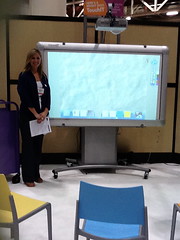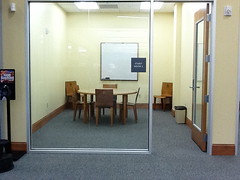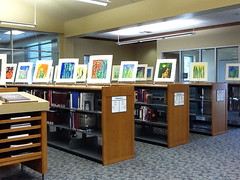From: Karen G. Schneider, Cupcake U. [note name change; not that I don’t like peanuts, but cupcakes are more strategically aligned with MPOW’s current direction]
Subject: ALA Annual 2011 (aka #ALA11): The Highlights
To: The World
Date: July 10, 2011
Flickr sets: Assorted Photos from #ALA11; Tour of St. Charles Parish Library
Professional Enrichment
ACRL President’s Program: From Idea to Innovation to Implementation: How Teams Make it Happen
James Young, a workplace systems consultant and the author of “Culturetopia,†gave a sparkling talk about what motivates people and what builds teams. He pointed out that Southwest is 85% unionized and yet their union contract has “warmth and friendliness†written into the company vision statement, enabling the company to hold employees to that standard. In turn, the company mission includes a commitment to the employees for a stable work environment and opportunities for growth.
Other key concepts Young delivered were the need to appreciate differences (especially work style, detail attention, and source of energy), soaring with your strengths, and watching the “emotional messageâ€â€”55% of which comes from gestures.
Books to purchase: Jane Elsea, The Four Minute Sell; Donald O. Clifton, Soar with your Strengths; Jason Young, Culturetopia
Battledecks
Battledecks is a competition geared toward librarians who present and train as part of their responsibilities. Contestants present extemporaneously to a deck of PowerPoint slides (often with unrelated and nonsensical images) which they have not previously seen, on an assigned topic such as “library of the future.â€Â Judges (influenced by an active and noisy audience) rate the presenters on their presentation skills.
The results are hilarious, showcase the best presenters in the profession (as well as the worst), and are also a subtle lesson in how to handle the occasional public failure that happens for all instructors.
Two minutes before the competition began, Daniel Ransom of MPOW was volunteered by his colleagues to be an audience “volunteer,†and despite the last-minute notice and the fact that his boss was sitting in the audience, he performed admirably.
Technology/Administration/Buildings
I attended “Designing a Specialty Commons,†sponsored by LLAMA. Seven panelists shared their building and renovation stories. There was nothing hugely new, but it was worth noting that all panelists talked about beginning the process by identifying specific, local requirements for a library, key stakeholders, and the major question they were trying to address – such as supporting curiosity, better understanding of emerging technologies, collaborative computing, statistical work. One (inevitable) caution: adding technology increases the need for back-end support.
Joe Agati of Agati Furniture spoke about the need to consider “technology, comfort, and cooties†(the latter being the personal zones for library users), and noted that most furniture has a tendency to dramatically outlive technology–a theme emphasized by Linda Demmers in a site visit to Cupcake U last January. As noted in the day-long ALCTS building seminar at ALA Midwinter 2011, panelists described using color and interesting furniture to make their spaces appealing.
Most panelists described deploying massive quantities of both “analog†and interactive whiteboards. Afterwards, in the Q&A, I asked the panel if any of them had begun deploying second-generation interactive whiteboards, such as the boards from Polyvision or TouchIT—dual-purpose surfaces (can use regular whiteboard pens), lighter, more modular tech (some of these boards are only powered by USB), and much less expensive. None of the presenters had, but they noted that technology was changing rapidly and that in some cases they were waiting to purchase technology until renovation or new building was completed.
Reader Services
In anticipation of building our popular-reading collection this summer, I attended two book-related events: Southern Writers and the Stonewall Book Awards. Both were wonderful events that replenished my literary soul. I am a big fan of Tayari Jones, who writes about the Southern-urban experience. A common theme was that writing is a slow, iterative process. “When you commit to your work, your work commits to you.â€
At the Stonewall Book Awards, Sarah Schulman and Dorothy Allison were amazing keynoters who lit the podium on fire. My tweet quoting Allison on archivists – “If you think librarians are funky and strange, you should talk to the archivists†– became a top tweet and was posted on the American Libraries magazine website.  Allison called libraries “the temple in which everything is available, in which our lives are honored.†Schulman called Susan Sontag a “Stepin Fetchit†for staying in the “content closet,†and indicted U.S. publishers for not treating lesbian authors as people, noting that in the UK, lesbian authors are more likely to get mainstream publishers and reviewers. Like I said, a heck of an event. I came home with signed copies of (free!) books.
A major downer for me was discovering that the LITA Imagineering Interest Group had sponsored Orson Scott Card to present at ALA. Card’s statements about homosexuality are out of sync with the positions on diversity shared by most libraries. As I posted earlier, in 2008, there is a major distinction between buying books that readers want to read and uplifting an author whose personal views are damaging to vulnerable young people. This was one of several incidents where LITA severely disappointed me at ALA11.
Other Events
I attended LITA’s Top Technology Trends session and the LITA “Awards Ceremony†(quotation marks intentional). Full disclosure: I am a former Trendster. I observe a growing tendency for TTT Trendsters to present trends and technologies they would like to see happening (Drupal, developers in every library, etc.) versus actual trends.
That said, Clifford Lynch was as always quite sage, talking both about the social-reading trends in the research community, computational photography, and the stratospheric rise in mobile tech. He also noted the huge rise in hardware-specific software and noted this was a return to a previous era that could “leave content more vulnerable to the ebb and flow of hardware.†For recommended reading (an audience question), Lynch pointed us to Kurzweil’s newsletter.
The LITA awards were pretty much just brief photo-ops tacked on after the Trends—award recipients were marched in front of cameras, and the smattering of people in this cold, dark room then applauded… a far cry from awards ceremonies of the past.
I realize that LITA has severe fiscal problems (in the red for two years now), but had they reached out to the membership, we could have found creative ways (including passing the hat) to make the event festive, as it had been in the past. As someone who had participated on an awards committee, I felt that this event shortchanged the award-winners, the award sponsors, and the committee members. I wrote both the award sponsor and committee chair to note my disappointment.
Navigator and Camino
I attended both user groups, and was excited to see the Navigator software roadmap and to see more libraries planning to join Camino, particularly after WMS integration is enabled.
I’m pondering a run for ALA Council, which would mean that by Midwinter 2013 I would have time commitments for several mornings at ALA. But that is definitely “crossing that bridge when I get to it.â€
Professional Participation
I reported out from a GLBTRT (Gay Lesbian Bisexual and Transgender Round Table) bylaws implementation task force I chaired from May 23 through June 26. The proposed roadmap for fairly significant changes approved by ballot in the Spring 2011 ALA elections was adopted unanimously (thanks to Lise Dyckman and Peter Hepburn, who did most of the mapping). I also volunteered to chair a procedural review committee to create job descriptions for the officers under the new structure.
Site Visit
On Tuesday, September 28, my longtime friend Vicki Nesting, assistant director at the East Regional Library, St. Charles Parish Public Library, toured me through two brand-new libraries—both East Regional and the Paradis branch.
As with most new library facilities, the new buildings were designed to support for personal technology (electricity and wifi), group study, instruction, pleasure reading, and other engagement. The furniture and color scheme was inviting—a mix of warm yellow and leafy green. (Disclaimer: I like any color, as long as it’s green.) Shelving was designed for browsing, and served a second use as display space. Study rooms advertised their presence through glass walls (a ubiquitous trend).
In the Paradis branch – an adorable wee library in a mixed-income community—the staff had just finished making popcorn for their movie showing that afternoon in a mixed-used program room.  This community has never had its own library, and response has been terrific.
The larger library had been open over a year, but still looked opening-day beautiful. Part of that was very clear message discipline (no grotty handlettered signage — what I call “library graffiti”) and part of that was a building design that didn’t force impromptu signage, but a very important ingredient was the conscious decision to build in lots of storage space, so that the cruft of library work was hidden (and well-organized).
We concluded with my last meal in Louisiana for this trip, a toothsome luncheon at Z’s Spot, a local “dive†with delicious crab cakes and hush puppies, where I had the chance to chat with other library staff.
Festivities
I only attended two “happy hours†at ALA11, since I wanted to pace myself, have some quiet time, and be rested each long day. The LITA Happy Hour, on Friday, was near the convention center but a bit grotty. GLBTRT’s Social, on Sunday, was in an upscale bar that while fun was packed so heavily I felt a little claustrophobic.
As always, the ad hoc events were the most fun. My favorite social hour was with an impromptu group who gathered Saturday evening at the Swizzle Stick to discuss management and leadership over refreshments (I shall ever refer to this as the Chicktail Hour). I also had breakfast at the Ruby Slipper three times (shrimp and grits done to perfection) and had a decent turtle soup at Muriel’s with a fun group of librarians I hadn’t spent time with before. I believe half the conference was at the Carousel late Sunday night.
Exhibits
The Morial Convention Center is a bit of a slog. I greeted most of our key vendors but spent the most time looking at furniture and interactive whiteboards.
Venue, Travel, Lodgings
NOLA is boiling hot in the summer, but this is offset by interesting sights, great food, and a reasonably compact conference footprint (considering ALA Annual is about 20,000 librarians, each of whom appears to be holding a meeting). Attendance was over 20,000—higher than anticipated, given the economy and the location (attendance tends to be better in areas with better population density).
The convention center is both awkward to navigate (very long and narrow) and had a pervasive problem with wifi access that made it hard to engage socially with key events. Our wifi access was hosted by Credo but I really can’t fault them. I think the bandwidth was simply not up to 20,000 librarians bearing multiple wifi-intensive devices.
Travel is expensive these days; that’s all there is to it. That said, my original advice to split a cab versus take a shuttle (faster and cheaper!) led to a ride from MSY to NOLA with Stephen Klein of the County of Los Angeles Public Library, who shared the West Hollywood library’s building story (we also agreed that Linda Demmers is an awesome library space planning consultant). Stephen also mentioned that this branch was adopting the “concierge” approach — something I’d like to hear more about.
My hotel, Chateau Le Moyne, was terrific: a good value at $85/night, quiet, clean, reasonably convenient (about a mile from the convention center)—no drama whatsoever.
FYI: In 2015, ALA Annual will be in San Francisco (for the first time since 2000).
I will (probably) see you in Dallas for ALA Midwinter, unless I decide to send myself to another conference (midwinter is on my dime, and I’m on the fence about Dallas).
Note: iPads were endemic. It was almost as if they had been issued at the airport on arrival to MSY.
Posted on this day, other years:
- Playing with new search technologies - 2007
- Educating LITA - 2007
- Glossary - 2005
- WritersMarket.Com - 2005













Sounds like a meaningful trip! What can you share with us about the OCLC Perceptions of Libraries, 2010 session? If I had been able to have the opportunity to go, this is one session that sounded extremely interesting to me.
I am a total “outsider” to the library planning world. I don’t know jack, but I’ve got opinions. I can make assumptions that these communities have their own resources: who to buy library furniture from (what bids were put out) from who is on the committee to choose furnishing for the library. Organizations only have x amount of money to burn and budgets have to be kept. But, I hate to say that the library you did a visit of looks very “institutional.” It looks depressing. Library spaces should be uplifting. And, not that I’ve been in prison or anything, but couldn’t library planners and consultants get more…hip?
Anyhow, you write great stuff and I love your insight. I have shared some of your posts on my Facebook page for all my cohorts in my library school to see. 🙂